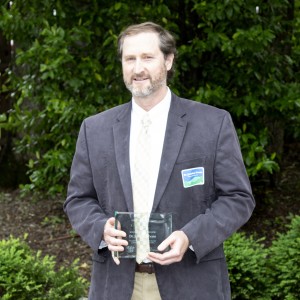Professor of Biology Jon Evans was named Conservation Educator of the Year by Tennessee Wildlife Federation.
Tennessee Wildlife Federation, one of the largest and oldest nonprofits dedicated to the conservation of Tennessee’s wildlife and natural resources, recently hosted its annual Conservation Achievement Awards. Since 1966, Tennessee Wildlife Federation has honored Tennesseans leading conservation throughout Tennessee; this year, 17 awards were presented to recipients from all corners of the state. Professor of Biology Jon Evans was named Conservation Educator of the Year.
 In addition to his teaching, Tennessee Wildlife Federation noted Evans’ work as assistant provost for environmental stewardship and sustainability (2011-2016) and his development of the Sewanee Environment Institute and Landscape Analysis Laboratory. Evans has taught hundreds of students the importance of forest conservation through collaborative research and strategic initiatives that promote sustainability and conservation for the University and the whole of the Cumberland Plateau.
In addition to his teaching, Tennessee Wildlife Federation noted Evans’ work as assistant provost for environmental stewardship and sustainability (2011-2016) and his development of the Sewanee Environment Institute and Landscape Analysis Laboratory. Evans has taught hundreds of students the importance of forest conservation through collaborative research and strategic initiatives that promote sustainability and conservation for the University and the whole of the Cumberland Plateau.
“The diverse group of award winners today serves as a reminder that successful conservation will always depend on a diverse and collaborative effort,” said Michael Butler, CEO of the Federation. “Our honorees have conducted important field work, secured crucial support, educated the next generation, and so much more.”
The research in Evans’ lab focuses on plant population dynamics and the processes that determine the composition and structure of plant communities over time and across landscapes.
They also study land-use history and exotic species introductions as drivers of long-term change in forest communities. Much of the research is conducted within ecosystems of the southern U.S., concentrated on the southern Cumberland Plateau and on the coastal barrier islands.
During his term as assistant provost for environmental stewardship and sustainability, Evans developed a comprehensive strategy for integrating sustainability across the curriculum, launched the Office of Environmental Stewardship and Sustainability, and wrote Sewanee’s first Sustainability Master Plan. As founding director of Sewanee’s Landscape Analysis Laboratory, Evans created one of the first GIS centers for research and teaching in the state. Conservation initiatives and environmental reforms in the land-use behavior of industrial timber companies, not only on the Plateau but elsewhere in the southeastern U.S., resulted from the multi-disciplinary research conducted in the LAL by Sewanee faculty, staff, and students.
Evans generates numerous student research opportunities; a large number of undergraduate students have co-authored papers with Evans, and many of these former students—now professors and conservation professionals themselves—continue to collaborate with him on projects. He launched a Sewanee Herbarium Post-Baccalaureate Fellows program as well as the Herbarium Undergraduate Fellows program, which allow students and recent graduates to begin and complete botanical research.

